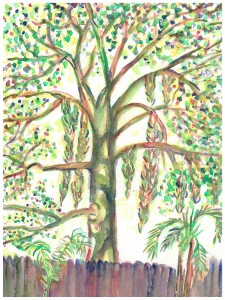Prenatal voyage shelless,
wombless, without shelter.
The human that bore me
a passage way, a conduit
to world of woods and thickets.
Fragment of primal essence
set free for a time, a journey.
First memories of Grandmother:
fleshy, round and delicious;
I wanted her to know
fierceness of my love;
I bit her as hard as
new teeth would allow.
I wished to devour her
so intense my devotion.
I wandered among hills
and copses, a return home,
to the place my mother dwells;
rise and dip of terrain
outline her tender bosom;
pound of waves, heart’s rhythm;
vagrant breeze her breath
against my face.
Since childhood I have run,
from dwelling place of men,
into her welcoming arms
to sleep contented nights
upon her warm earth,
to wander fields and thickets
on winter’s clear, crisp days.
Her many moods reflect my own.
Always concerns, controversies:
their little girl, first born,
so aloof from convention.
A child who spends spans
in forest; returns dirty,
scratched, clutching latest
treasure for growing menagerie.
If I had been the original,
on first rumor of the tree
it would become my quest;
I would not require
temptation of a snake.
The judge, Charlie Whinney wrote about the poem: “My first short-listed piece is the one I enjoyed reading the most. It is a high-quality poem that tackles the title in a brilliant, imaginative and unlikely way. ‘Genesis of a Dryad ‘ draws seamlessly on mythology, fantastical anecdote and biblical themes to build a complete narrative that is both descriptive of nature and also a life story with tenuous but tantalising analogies. I might be reading too much into this, but I liked the use of myth for this title as for young children ‘Mom’ or ‘Mummy’ is a concept bigger than the mere practical and physical; ‘Mother’ is the solid unmoveable reference around which the rest of life revolves, a force in nature like gravity. The mythical Dryad in this poem has many of these qualities, but also has its own life, rhythms and agenda described that children could never perceive, and the Dryad becomes more and more ‘human’ as the poem progresses.”

